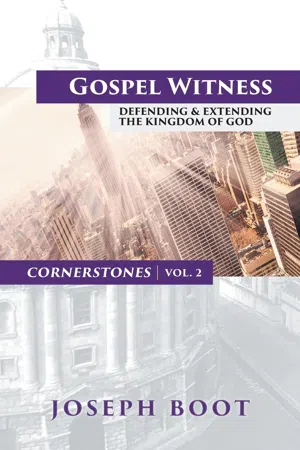![]()
THE CONTEXT: THE CULTURAL CHALLENGE IN THE WEST
“YOU WILL BE MY WITNESSES IN JERUSALEM, IN ALL JUDEA AND SAMARIA, AND TO THE ENDS OF THE EARTH” (ACTS 1:8).
FACING THE NEW ORTHODOXY
It has been rightly said that the loves of a few men move the lives of many. The deeply-held convictions of a zealous minority, tenaciously pursued, are culturally formative—at times for good, and at times for ill. Culture has been variously defined, but Henry Van Til’s succinct description of culture as “religion externalized” is, in my judgment, the most helpful and accurate: culture is the manifestation of a society’s faith or ultimate commitment, expressed in everything from art and architecture to politics and literature.1 In our own time, there can be no denying the staggering success of an anti-Christian political religion that has, especially over the past sixty years, steadily overturned what were, previously, broadly Christian institutions, laws and cultural mores.
Indeed, this anti-Christian cultural movement has made a special point of challenging every scripturally-rooted creational norm— right down to the foundations of life’s sanctity, the nature of marriage, sexuality, and human identity as constituted by the binaries of male and female. Things literally unthinkable to my grandparents’ generation have become established social orthodoxy, and heretics are increasingly being punished by censure, exclusion, shaming, ostracism, legal threats, human rights commissions, loss of social standing, loss of employment and even loss of liberty behind bars if reparations are not made. The seemingly unstoppable and rapid advance of this neo-Marxist and neo-pagan worldview, aided by a largely unprepared and ineffective church pulpit, means a religious revolution has left many Christians stunned, confused and often afraid to do anything but retreat or concede. In such a context, faithful gospel witness looks distinctly like courage, while compromise looks more and more like cowardice.
In his 2016 book The Demon in Democracy: Totalitarian Temptations in Free Societies, the Polish philosopher and politician Ryszard Legutko offers a penetrating analysis of the religion of liberal democracy and the gradual decay of western states into increasingly oppressive, revolutionary societies, in the influential grip of a committed cultural elite. These ‘progressive’ societies, he argues, are increasingly manifesting a remarkable and indeed disturbing similarity in character to the former communist regime in Eastern Europe.
On this new homogenization of acceptable opinion, he notes that
unfortunately, since the transformation of democracy into a liberal democracy, the spectrum of political acceptability has been distinctly limited. Liberal democracy has created its own orthodoxy… [and] a political mechanism for the election of people, organizations and ideas in line with the orthodoxy.2
The allusion to a difference between democracy and liberal democracy refers to the fact that there is nothing peculiarly or ideologically ‘liberal’ about political organization involving the consent of the people to be governed, their participation in that government, and the democratic attempt to limit the concentration of power in any one individual or institution. There were early experiments with democracy in ancient Greece that were not ‘liberal’ by any modern standard and both the Whigs and Tories in English political life supported Parliamentary democracy. But modern liberal democracy invokes a particular ideological vision to be attached to government by consent. It is “a powerful unifying mechanism, blurring differences between people and imposing uniformity of views, behaviour and language…. The impetus of liberalism was understood to lie in its cooperative feature, which was to bring the human race to a higher stage of development.”3 This concept of bringing man to higher stages of development by political means is of a religious character. So, while recognizing there remain substantial pockets of resistance to this contemporary faith, modern liberal democracy, with its egalitarian worldview, has become a de facto cultural religion with the power to discipline nonconformists.
Recognizing a variety of historical forces giving shape to this homogenous ‘new orthodoxy,’ Legutko identifies the political revolutions of the 1960s as having had the decisive impact, moving an impatient utopian and collectivist radicalism into a position of cultural dominance. He comments,
The language of the revolution was a medley of anarchist slogans, a Marxist rhetoric of class struggle and the overthrowing of capitalism, and a liberal language of rights, emancipation, and discrimination. Capitalism and the state were the main targets, but universities, schools, family, law and social mores were attacked with equal vehemence.4
He points out that this ideological movement has continued into the present, and grown to the point where the worldview has become institutionalized and entrenched.
NEW QUESTIONS AND A NEW SITUATION
This gradual sea-change in our culture’s underlying religious assumptions has logically led to significant variation in the types of questions or objections people now have regarding the Christian faith, thereby impacting the task of Christian witness as we think about faithful evangelism and apologetics. A generation ago, people’s questions and objections tended to focus on things like the historicity of the resurrection, the authenticity of the New Testament text, or the plausibility of miraculous claims in Scripture. Now, younger people especially are typically unconcerned with denying miracles, but will often object that Christianity is too exclusive, oppressive and intolerant, or that it has an imperialist history with blood on its hands. Christianity is deemed irrelevant, outmoded and untrue, not because there is a lack of evidence for the resurrection, but because Christians don’t appear to advance ‘equality’ or ‘saving the planet,’ reducing carbon footprints by any means—including abortion. This generation, indoctrinated from elementary school in the thought forms of radical progressives from Herbert Marcuse to Judith Butler (all rooted in neo-Marxist philosophical assumptions), wants to know why anyone would believe in a God that discriminates against women, denies her the right to choose, and excludes practicing homosexuals and other members of the queer community from the kingdom of God—a God who doesn’t advance ‘social justice’ in the world just isn’t worth believing in. Some Christians have felt so overwhelmed or intimidated by the apparent force of these objections, that they have either stopped witnessing to the truth of the gospel or have been ‘converted’ themselves, seeking to synthesize Christianity with the cultural religion of the age.
COMPLACENCY AND COMPROMISE
How is it that Christians have been caught so off-guard and flat-footed in our revolutionary times? Why has our witness been so muted and often ineffective? There are many things that could be said about this question, but one important answer is that, in general, Christian believers in the West have lacked vigilance and so neglected the development and defense of a consistently scriptural vision of reality in the wake of our remarkable historic success in evangelizing and shaping Western cultural life.
In other words, we too readily assumed that broadly Christian norms would hold; that largely Christian categories of life and thought, established by centuries of tradition, would remain the religious presuppositions of the people; that a robustly developed scriptural philosophy and cultural apologetic were unnecessary because Christian assumptions were now simply ‘common sense’ assumptions; that the task of evangelization on our own shores was largely done and the sacrifices of the past no longer necessary. Biblical laws were really ‘natural laws’—surely agreed upon by all ‘civilized’ people—and the Christian view of life and truth, liberty and justice was in fact an essentially neutral perspective received by every ‘rational’ state in terms of God’s common grace. In short, we thought we need no longer contend for being distinctly Christian or explicitly directed by biblical revelation as a culture, because people already accepted broadly Christian ideas. In the insightful words of Peter Hitchens,
It was the triumph of the Christian religion that for many centuries it managed to become the unreasoning assumption of almost all, built into every spoken and written word, every song, and every building. It was the disaster of the Christian religion that it assumed this triumph would last forever and outlast everything, and so it was ill equipped to resist the challenge of a rival when it came, in this, the century of the self. The Christian religion had no idea that a new power, which I call selfism, would arise. And, having arisen, selfism has easily shouldered its rival aside. In free competition, how can a faith based upon self-restraint and patience compete with one that pardons, unconditionally and in advance, all the self-indulgences you can think of, and some you cannot?5
In the face of what Hitchens here memorably calls selfism, where every man is his own god (Genesis 3:5), we have quickly capitulated, our witness dying out with a whimper. With all moral restraint cast to the wind, who can resist? First, we gradually withdrew from faithful witness in the fields of conflict in family, education, law, politics, art and every other sphere. Soon thereafter we began justifying our abandonment of a distinctly Christian vision for life in the world altogether, settling for the ‘neutral’ status quo and retreating into the four walls of the church. But even there many began claiming that surrender, synthesis or compromise with the new religious power was the better part of valour for the ‘survival’ of the faith—a faith that by this point had become radically altered and increasingly unrecognizable. At this steep trajectory of declension we should not be surprised, for once you have self-consciously abdicated the Lordship of Jesus Christ in one sphere of life, you will eventually surrender your witness to it everywhere.
In a damning display of irony, it so happened that with the collapse of our biblical witness—the various spheres of culture effectively abandoned—and the Christian’s life in the world dominated by a secular, even pagan vision, the church itself soon became radically politicized, so that challenging the Christian in the pew about the issues of life that matt...


